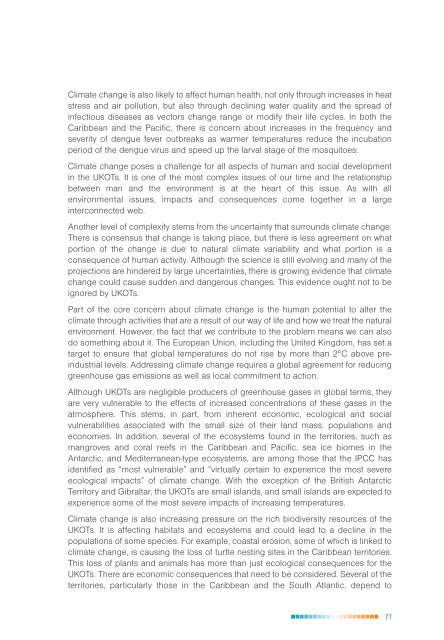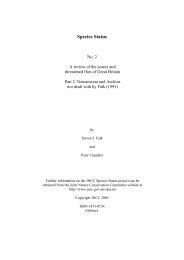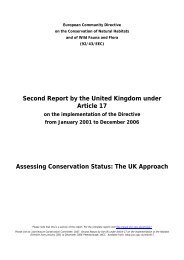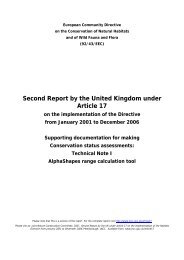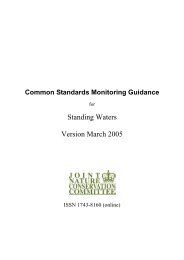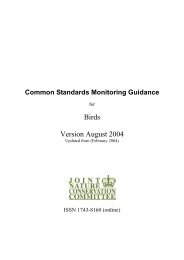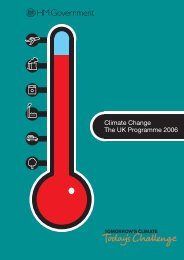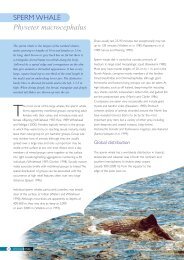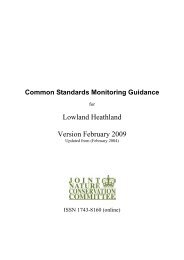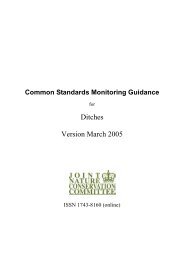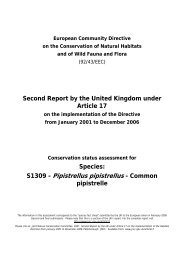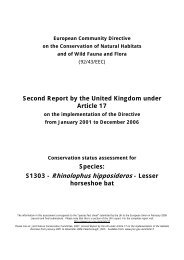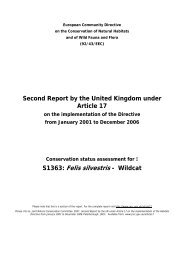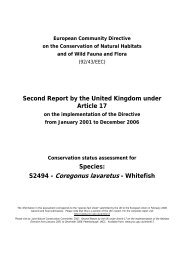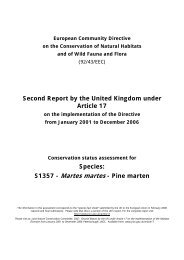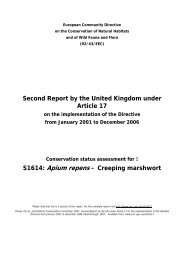Climate change in the UKOTs an overview of the ... - JNCC - Defra
Climate change in the UKOTs an overview of the ... - JNCC - Defra
Climate change in the UKOTs an overview of the ... - JNCC - Defra
Create successful ePaper yourself
Turn your PDF publications into a flip-book with our unique Google optimized e-Paper software.
<strong>Climate</strong> <strong>ch<strong>an</strong>ge</strong> is also likely to affect hum<strong>an</strong> health, not only through <strong>in</strong>creases <strong>in</strong> heat<br />
stress <strong>an</strong>d air pollution, but also through decl<strong>in</strong><strong>in</strong>g water quality <strong>an</strong>d <strong>the</strong> spread <strong>of</strong><br />
<strong>in</strong>fectious diseases as vectors <strong>ch<strong>an</strong>ge</strong> r<strong>an</strong>ge or modify <strong>the</strong>ir life cycles. In both <strong>the</strong><br />
Caribbe<strong>an</strong> <strong>an</strong>d <strong>the</strong> Pacific, <strong>the</strong>re is concern about <strong>in</strong>creases <strong>in</strong> <strong>the</strong> frequency <strong>an</strong>d<br />
severity <strong>of</strong> dengue fever outbreaks as warmer temperatures reduce <strong>the</strong> <strong>in</strong>cubation<br />
period <strong>of</strong> <strong>the</strong> dengue virus <strong>an</strong>d speed up <strong>the</strong> larval stage <strong>of</strong> <strong>the</strong> mosquitoes.<br />
<strong>Climate</strong> <strong>ch<strong>an</strong>ge</strong> poses a challenge for all aspects <strong>of</strong> hum<strong>an</strong> <strong>an</strong>d social development<br />
<strong>in</strong> <strong>the</strong> <strong>UKOTs</strong>. It is one <strong>of</strong> <strong>the</strong> most complex issues <strong>of</strong> our time <strong>an</strong>d <strong>the</strong> relationship<br />
between m<strong>an</strong> <strong>an</strong>d <strong>the</strong> environment is at <strong>the</strong> heart <strong>of</strong> this issue. As with all<br />
environmental issues, impacts <strong>an</strong>d consequences come toge<strong>the</strong>r <strong>in</strong> a large<br />
<strong>in</strong>terconnected web.<br />
Ano<strong>the</strong>r level <strong>of</strong> complexity stems from <strong>the</strong> uncerta<strong>in</strong>ty that surrounds climate <strong>ch<strong>an</strong>ge</strong>.<br />
There is consensus that <strong>ch<strong>an</strong>ge</strong> is tak<strong>in</strong>g place, but <strong>the</strong>re is less agreement on what<br />
portion <strong>of</strong> <strong>the</strong> <strong>ch<strong>an</strong>ge</strong> is due to natural climate variability <strong>an</strong>d what portion is a<br />
consequence <strong>of</strong> hum<strong>an</strong> activity. Although <strong>the</strong> science is still evolv<strong>in</strong>g <strong>an</strong>d m<strong>an</strong>y <strong>of</strong> <strong>the</strong><br />
projections are h<strong>in</strong>dered by large uncerta<strong>in</strong>ties, <strong>the</strong>re is grow<strong>in</strong>g evidence that climate<br />
<strong>ch<strong>an</strong>ge</strong> could cause sudden <strong>an</strong>d d<strong>an</strong>gerous <strong>ch<strong>an</strong>ge</strong>s. This evidence ought not to be<br />
ignored by <strong>UKOTs</strong>.<br />
Part <strong>of</strong> <strong>the</strong> core concern about climate <strong>ch<strong>an</strong>ge</strong> is <strong>the</strong> hum<strong>an</strong> potential to alter <strong>the</strong><br />
climate through activities that are a result <strong>of</strong> our way <strong>of</strong> life <strong>an</strong>d how we treat <strong>the</strong> natural<br />
environment. However, <strong>the</strong> fact that we contribute to <strong>the</strong> problem me<strong>an</strong>s we c<strong>an</strong> also<br />
do someth<strong>in</strong>g about it. The Europe<strong>an</strong> Union, <strong>in</strong>clud<strong>in</strong>g <strong>the</strong> United K<strong>in</strong>gdom, has set a<br />
target to ensure that global temperatures do not rise by more th<strong>an</strong> 2°C above pre<strong>in</strong>dustrial<br />
levels. Address<strong>in</strong>g climate <strong>ch<strong>an</strong>ge</strong> requires a global agreement for reduc<strong>in</strong>g<br />
greenhouse gas emissions as well as local commitment to action.<br />
Although <strong>UKOTs</strong> are negligible producers <strong>of</strong> greenhouse gases <strong>in</strong> global terms, <strong>the</strong>y<br />
are very vulnerable to <strong>the</strong> effects <strong>of</strong> <strong>in</strong>creased concentrations <strong>of</strong> <strong>the</strong>se gases <strong>in</strong> <strong>the</strong><br />
atmosphere. This stems, <strong>in</strong> part, from <strong>in</strong>herent economic, ecological <strong>an</strong>d social<br />
vulnerabilities associated with <strong>the</strong> small size <strong>of</strong> <strong>the</strong>ir l<strong>an</strong>d mass, populations <strong>an</strong>d<br />
economies. In addition, several <strong>of</strong> <strong>the</strong> ecosystems found <strong>in</strong> <strong>the</strong> territories, such as<br />
m<strong>an</strong>groves <strong>an</strong>d coral reefs <strong>in</strong> <strong>the</strong> Caribbe<strong>an</strong> <strong>an</strong>d Pacific, sea ice biomes <strong>in</strong> <strong>the</strong><br />
Antarctic, <strong>an</strong>d Mediterr<strong>an</strong>e<strong>an</strong>-type ecosystems, are among those that <strong>the</strong> IPCC has<br />
identified as “most vulnerable” <strong>an</strong>d “virtually certa<strong>in</strong> to experience <strong>the</strong> most severe<br />
ecological impacts” <strong>of</strong> climate <strong>ch<strong>an</strong>ge</strong>. With <strong>the</strong> exception <strong>of</strong> <strong>the</strong> British Antarctic<br />
Territory <strong>an</strong>d Gibraltar, <strong>the</strong> <strong>UKOTs</strong> are small isl<strong>an</strong>ds, <strong>an</strong>d small isl<strong>an</strong>ds are expected to<br />
experience some <strong>of</strong> <strong>the</strong> most severe impacts <strong>of</strong> <strong>in</strong>creas<strong>in</strong>g temperatures.<br />
<strong>Climate</strong> <strong>ch<strong>an</strong>ge</strong> is also <strong>in</strong>creas<strong>in</strong>g pressure on <strong>the</strong> rich biodiversity resources <strong>of</strong> <strong>the</strong><br />
<strong>UKOTs</strong>. It is affect<strong>in</strong>g habitats <strong>an</strong>d ecosystems <strong>an</strong>d could lead to a decl<strong>in</strong>e <strong>in</strong> <strong>the</strong><br />
populations <strong>of</strong> some species. For example, coastal erosion, some <strong>of</strong> which is l<strong>in</strong>ked to<br />
climate <strong>ch<strong>an</strong>ge</strong>, is caus<strong>in</strong>g <strong>the</strong> loss <strong>of</strong> turtle nest<strong>in</strong>g sites <strong>in</strong> <strong>the</strong> Caribbe<strong>an</strong> territories.<br />
This loss <strong>of</strong> pl<strong>an</strong>ts <strong>an</strong>d <strong>an</strong>imals has more th<strong>an</strong> just ecological consequences for <strong>the</strong><br />
<strong>UKOTs</strong>. There are economic consequences that need to be considered. Several <strong>of</strong> <strong>the</strong><br />
territories, particularly those <strong>in</strong> <strong>the</strong> Caribbe<strong>an</strong> <strong>an</strong>d <strong>the</strong> South Atl<strong>an</strong>tic, depend to<br />
11


